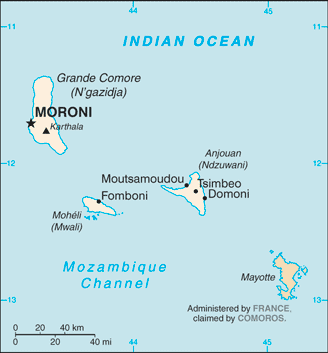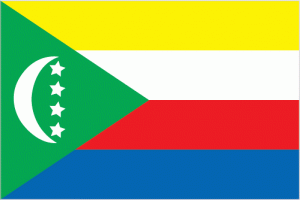Comoros
 Aglow Status: No Aglow activity
Aglow Status: No Aglow activity
Capital: Moroni
Pray:
- We are praying for Aglow to be affiliated in every nation in the world. We are very close to reaching that goal. Let’s continue to move forward together, an army in the Spirit, to see Every nation touched, every heart changed.
- Pray that an Aglow Prayer Group will be established in the capital city.
- Pray for many to arise in Aglow International in Comoros.
Proclaim:
- Arise, shine; for your light has come! And the glory of the LORD is risen upon you. For behold, the darkness shall cover the earth, and deep darkness the people; but the LORD will arise over you, and His glory will be seen upon you. Isaiah 60:1,2 (NKJV)
- Lift up your heads, O you gates! Lift up, you everlasting doors! And the King of glory shall come in. Who is this King of glory? The Lord of hosts, He is the King of glory. Selah Psalm 24:9-10 (NKJV)
Interesting Facts About
 Background: The archipelago of the Comoros in the Indian Ocean, composed of the islands of Mayotte, Anjouan, Moheli, and Grande Comore declared independence from France on 6 July 1975. Residents of Mayotte voted to remain in France, and France now has classified it as a department of France. Since independence, Comoros has endured political instability through realized and attempted coups. In 1997, the islands of Anjouan and Moheli declared independence from Comoros. In 1999, military chief Col. AZALI Assoumani seized power of the entire government in a bloodless coup; he initiated the 2000 Fomboni Accords, a power-sharing agreement in which the federal presidency rotates among the three islands, and each island maintains its local government.
Background: The archipelago of the Comoros in the Indian Ocean, composed of the islands of Mayotte, Anjouan, Moheli, and Grande Comore declared independence from France on 6 July 1975. Residents of Mayotte voted to remain in France, and France now has classified it as a department of France. Since independence, Comoros has endured political instability through realized and attempted coups. In 1997, the islands of Anjouan and Moheli declared independence from Comoros. In 1999, military chief Col. AZALI Assoumani seized power of the entire government in a bloodless coup; he initiated the 2000 Fomboni Accords, a power-sharing agreement in which the federal presidency rotates among the three islands, and each island maintains its local government.
AZALI won the 2002 federal presidential election as president of the Union of the Comoros from Grande Comore Island, which held the first four-year term. AZALI stepped down in 2006 and President Ahmed Abdallah Mohamed SAMBI was elected to office as president from Anjouan. In 2007, Mohamed BACAR effected Anjouan’s de-facto secession from the Union of the Comoros, refusing to step down when Comoros’ other islands held legitimate elections in July. The African Union (AU) initially attempted to resolve the political crisis by applying sanctions and a naval blockade to Anjouan, but in March 2008 the AU and Comoran soldiers seized the island. The island’s inhabitants generally welcomed the move. In 2009, the Comorian population approved a constitutional referendum extending the term of the president from four years to five years. In May 2011, Ikililou DHOININE won the presidency in peaceful elections widely deemed to be free and fair. In closely contested elections in 2016, former President AZALI Assoumani won a second term, when the rotating presidency returned to Grande Comore.
A new July 2018 constitution removed the presidential term limits and the requirement for the presidency to rotate between the three main islands. In August 2018, President AZALI formed a new government and subsequently ran and was elected president in March 2019.
Government Type: federal presidential republic
Population: 864,335 (July 2021 est.)
Ethnic Groups: Antalote, Cafre, Makoa, Oimatsaha, Sakalava
Languages: Arabic (official), French (official), Shikomoro (official; a blend of Swahili and Arabic) (Comorian)
Religions: Sunni Muslim 98%, other (including Shia Muslim, Roman Catholic, Jehovah’s Witness, Protestant) 2%
Interesting Facts information from the cia.gov website. Read more about Comoros

[…] este mes especialmente por: Camboya, Comoras, Islas Cook, Timor Oriental, […]